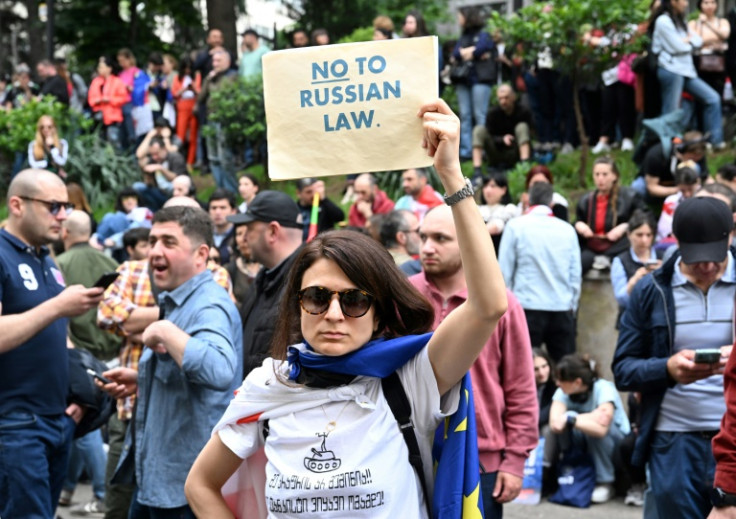
Around 200 Georgian NGOs on Wednesday vowed to defy a "foreign influence" law that has caused deep divisions in the Caucasus country, triggering mass protests and international condemnation.
The law, which critics have compared to repressive Russian legislation used to silence dissent, forces NGOs and media receiving at least a fifth of their funding from abroad to register as "organisations pursuing the interests of a foreign power".
The ruling Georgian Dream party pushed it through parliament in a final vote on Tuesday, overriding a veto lodged by pro-EU President Salome Zurabishvili.
"By adopting this law, the authorities want to subdue Georgia's civil sector," the roughly 200 NGOs said in a statement.
"The Russian law will not work in our country and will remain an empty piece of paper, which nobody will obey," it added.
Opposition parties and rights groups fear that Georgian Dream will use the measures to tighten controls over election monitors and journalists to secure another victory in a coming vote.
"We, Georgia's civil organisations, promise to defend the elections and the votes of every single citizen," the NGOs said.
Rights groups including the Georgian branch of anti-corruption group Transparency International have told AFP the law could see their assets frozen and their work limited.
The chairwoman of the Tbilisi-based GYLA rights advocacy group, Nona Kurdovanidze, said the "law is unconstitutional and stigmatises NGOs".
"It is also unacceptable to obey a law, which -- as Brussels has said - goes contrary to Georgia's European path," she told AFP.
Brussels has warned the measure is "incompatible" with the ex-Soviet republic's longstanding bid for EU membership.
Georgia's desire to join the bloc is enshrined in its constitution and supported by more than 80 percent of the population, according to opinion polls.
"That's why up to 200 NGOs declared that they will not be complying with the law's requirements," Kurdovanidze said.
"Georgian Dream is creating a governance system devoid of critical media or civil groups capable of raising their voices against democratic backsliding in general and electoral violations in particular," said Eka Gigauri, executive director of Transparency International-Georgia.
Amnesty International added Wednesday: "This malevolent piece of legislation must be scrapped immediately as it directly violates the right to freedom of association."
It also called for the government to end a "campaign of intimidation and violence against Georgian civil society and against those who oppose this law through protest and other peaceful means."
As the law worked its way through parliament, dozens of top NGO workers were targeted with phone calls and had their faces plastered on insulting posters.
Several opposition figures have reported being physically attacked by unidentified assailants, who they said were connected to the ruling party.
Georgian Dream, in power since 2012, faces mounting accusations of derailing Georgia from its Western trajectory and leading the country back into Russia's orbit.
The party says it is committed to Georgia's European aspirations and defends the law as aimed at increasing the transparency of NGO funding.
It argues that Western-funded groups undermine Georgia's sovereignty.
The Black Sea country has been gripped by a wave of unprecedented daily rallies for the past seven weeks since the party re-introduced the legislation in April, a year after dropping similar measures after a public outcry.









